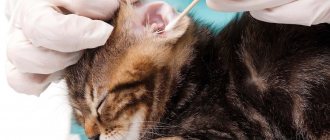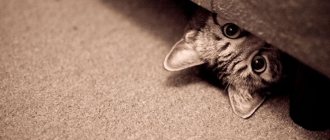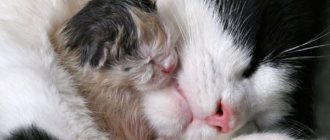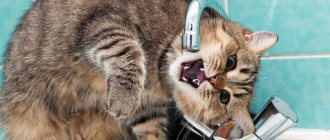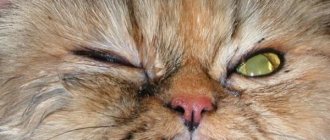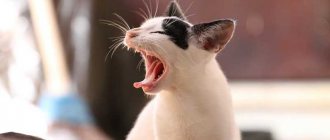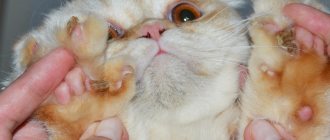If a cat eats soil, this may be a manifestation of illness, lack of vitamins, psychological disorders, stress, as well as out of curiosity or to cleanse the stomach. Consumption of soil is dangerous due to the entry of pathogenic bacteria, small glass fragments, and toxic impurities into the body. If the owner notices changes in the pet's taste preferences, he should be shown to the veterinarian. The specialist will conduct a diagnosis and recommend what to do to rid the animal of the bad habit.
According to the observation of veterinarian N. Inyakina, eating disorders are more common in Burmese and Siamese breeds.
Exploring the world around us
Both children and kittens actively explore their environment. The desire to taste inedible objects, including plants and soil, can lead to negative consequences for your pet. Toxic finishing materials and poisonous flowers often lead to poisoning and death of the animal.
If you notice your cat's increased attention to dangerous objects, you should interest her in new toys or plants specially grown for chewing. You can germinate wheat, oats, and lawn grass in a pot. Edible toys will keep the kitten occupied for a long time and dangerous sabotage will not become a habit.
An animal can also start using a pot with soil as a toilet. Scattered soil and a damaged plant will bring little joy to any owner. Therefore, if you cannot distract your pet from a container with soil, then it is better to move the flowerpot to an inaccessible place.
Why do cats dig in flowers?
There are several reasons why domestic cats climb on pots of soil and chew green spaces in the house. Here's what experts think about this:
- Lack of vitamins and microelements in the animal’s body. Street cats look for medicinal grass and eat it, which allows the body to obtain the necessary substances. Domestic cats can eat plants in flower pots, which is very unsafe for the animal itself. For example, some types of house plants are poisonous, and if a cat begins to gnaw on such a stem, there is a high risk of severe poisoning of the animal.
- The cat is looking for a convenient place to go to the toilet. For example, the animal does not like the filler in the tray, but the soil in flower pots is very convenient for this matter. The reason for this cat behavior can also be an uncleaned litter box. Keep your cat litter clean and change the litter in it in a timely manner!
- Cats can climb on window sills and damage green spaces solely because of resentment toward their owner due to lack of attention. With this behavior, the cat not only wants to take revenge, but also to draw attention to itself.
It is not difficult to understand the main reason why a cat climbs into flower pots. If an animal digs the ground and relieves itself there, it means that she is unhappy with her cat litter.
The cat eats the stems and leaves of plants - its body lacks vitamins.
An animal simply spoils flowers in pots, throws them on the floor, chews leaves or breaks branches - a clear sign of a lack of attention on your part.
Attention deficit
Cats are provocateurs. There is no other animal in nature that is capable of taking revenge or doing something to spite its owner. Therefore, if you pay little attention to a cat, it is able to find something to do to its liking. No person will stand and watch while an animal digs or eats soil from a flower pot. The cat quickly remembers the owner’s reaction and subsequently attracts attention to itself in this way.
Boredom and monotony strengthen the animal's exploratory instincts. Lay out dry food, unusual sleeping places and joint games will diversify the pet's life and quench curiosity.
Should a cat be allowed to eat soil?
Ingesting soil inside is not natural for a cat and should not be allowed. If a cat eats soil, there is a high risk of unpredictable consequences for his health. A loving owner must urgently find out the reason for this special behavior of the pet and eliminate the factor that provoked the phenomenon.
The danger that eating soil poses to an animal lies primarily in the presence of parasite larvae and eggs in it. As a result of this, when a cat eats soil, it swallows them, which causes infection.
Also, a cat can seriously damage its mouth or intestines if there is a splinter in the ground. In addition to the fact that it will cause wounds, after being in the ground it will cause a serious infection that will need to be treated with the involvement of a veterinarian.
Mental disorders
Pica is a disorder similar in severity to anorexia and bulimia. Expressed in the desire to eat inedible objects. Appears as a result of mental disorder, nervous shock and can lead to death.
Research by scientists on animal behavior has revealed that pets, just like people, are susceptible to depression and fear. Pica in science is divided into two types:
- A common disorder is eating paper, stones, and earth.
- Coprophagia is the eating of feces.
Cats are susceptible to both forms of the disease. In order to determine why a cat eats soil from a psychological point of view, it is necessary to analyze all the facts from the pet’s life.
The problem could begin in childhood, especially for animals picked up from the street at an early age. Starvation leads to death after 3-4 days. Even if the kitten was rescued during this period and provided with the required care, the consequences of the injury may appear several years later. The animal will more often suffer from gluttony throughout its life, and this often leads to the second type of eating disorder - coprophagia.
It is more difficult for a domestic cat to experience hunger, which, due to circumstances, finds itself on the street and is forced to remain without food. Having found a secluded refuge, the pet hides and the feeling of fear blocks the need for food. The pet is paralyzed by fear and prevents it from moving. If the owners manage to find the animal and save it, then recent impressions haunt the shocked person for a long time. Here is another psychological reason why a cat eats soil from indoor pots.
Why can a cat eat soil?
Some felines shock their owners by happily eating soil. Both yard soil and soil from a flower pot are used (depending on the type of life the pet leads - wild or domestic). This condition is a type of feline pica or perverted appetite.
Many cats suffer from a craving for indiscriminate consumption of inedible and even harmful substances (soil, plastic, wool, synthetic materials and even their own feces). Naturally, a caring owner wants to find an answer to the question, why does a cat eat soil? After all, he is worried about the possible consequences of this habit for her health.
Stomach cleansing
Representatives of the cat family tend to cleanse the intestines and stomach of parasites and accumulated hair. In the wild, animals use sand as a sorbent. It irritates the mucous membrane and leads to vomiting along with hair clots, and also destroys parasites in the colon. Therefore, the explanation for why a cat eats soil may lie in the body's natural cleansing process.
Earth or sand may be present in the feces, and the animal will eat the soil with such a problem greedily. Laboratory analysis will help determine the presence of a worm. This way you can confirm the relationship between eating soil and the presence of parasites.
At the same time, preventive measures do not provide a 100% guarantee of protection against worms and pests, since their range of action is limited.
Reasons for eating the earth
The following 4 main reasons can cause a craving for the ground in cats::
- disorders of the psychological state (not to be confused with the mental state, although the psyche of cats also sometimes suffers);
- damage by certain parasites;
- lack of minerals and vitamins in the body;
- the need to remove accumulations of hair from the stomach.
Depending on what caused the particular behavior, the method for eliminating it is determined. It is usually not difficult to restore the cat to its normal state and stop eating the soil. If, despite all efforts, it is not possible to restore the pet’s normal eating behavior, then the help of a veterinarian will be required.
Psychological problems in which a cat eats soil
A number of animals exhibit strange eating behavior when depressed or stressed. At the same time, the cat often eats soil from a flower pot or gnaws it while walking. The development of stress and depression is influenced by many factors, including the breed of the animal. If the cat is very emotional, then any sudden changes can cause a disturbance in its condition. Pets eat soil very often due to stress. Stress occurs in cats mainly for the following reasons :
- moving;
- new owner;
- long periods of loneliness, if before this the cat was constantly surrounded by attention;
- the appearance of a new animal in the family (especially if it is an adult and quite aggressive dog);
- the arrival of new family members (for example, the arrival of guests for a long time);
- sudden change in conditions of detention;
- sudden change in diet.
At a moment of stress, a cat experiences not only an emotional change in behavior, but also a change in taste. With such a violation, the animal begins to eat objects or soil that are inappropriate for this purpose in order to calm down, and not because it is hungry, or the cat is attracted by the taste. With such unusual behavior, some pets try to attract the attention of the owner, if it is the lack of communication with him that has caused depression.
By surrounding the pet with care and using mild herbal sedatives for cats, the owner can eliminate the problem. Ideally, consult your veterinarian first. In especially severe cases, in addition to sedatives, the animal may also need antidepressants.
Parasitic lesions in which the cat eats soil
When a cat has worms, she tries to cleanse the body of them. Wild animals often eat sand for this purpose. Pets, for whom such a natural instinct is very strong, in the absence of sand and hard grass that can successfully replace it, begin to swallow the earth. It irritates the intestines and causes vomiting, which removes the parasite eggs and themselves from the body.
The following signs indicate that a cat is suffering from worms::
- weight loss,
- frequent vomiting,
- lacrimation,
- decrease in wool quality.
The problem is eliminated with the help of broad-spectrum anti-worming drugs that destroy round and tapeworms. If the infestation is very severe, then the help of a veterinarian will be required, since the cat needs to be given a particularly strong anti-parasite drug by injection. As soon as the body is cleansed of them, the pet will stop eating soil. Parasites can be acquired from cats that do not even walk outside.
If the cat begins to vomit worms in the ground, this is the most likely reason.
Vitamin and mineral deficiency
Eating soil for this reason is usually observed in the spring, when after winter the animal’s body is weakened and, like in humans, suffers from vitamin deficiency. Especially often during this period, cats eat soil purchased by the owner for seedlings, since during production it is artificially enriched with minerals, without which plant growth is impossible. Due to the fact that fertilizer is also added to the soil, such food can cause poisoning in the cat. Therefore, if it is noticed that a cat is eating purchased soil, it must be urgently hidden from him.
Also in the spring, kittens that are actively growing may develop iron deficiency anemia, which, if not promptly corrected, can cause serious health problems. The kitten eats the earth because it finds the necessary element in it. Properly, the lack of the substance is eliminated by reviewing the diet and, in severe cases, injections of iron supplements. To prevent this problem while growing a kitten, you should ask your veterinarian in advance about the rules for feeding the baby.
If you have vitamin deficiency and anemia, you should not let your cat eat soil and expect everything to go away on its own. To restore the cat’s normal condition, it is necessary to urgently show it to a veterinarian and carry out the necessary therapy. To prevent problems, it is useful to add 3 pinches of wood ash to your cat’s food every day, which is an ideal natural source of minerals for cats. It is also worth buying a vitamin complex to prevent vitamin deficiency.
Accumulation of fur in the stomach
Long-haired cats and cats suffer more from the problem. While licking themselves, they swallow a large amount of wool, which is not broken down by gastric juice and is not digested. Gradually it gathers into lumps in the animal’s stomach and kills it. If your cat does not get rid of the hairball in a timely manner, there is a high risk of developing intestinal obstruction, which will require surgery to correct.
If a cat can walk freely on the street, then it eats grass to cleanse its stomach. At home, if special cat grass is not grown for her, she eats soil from a flower pot, which acts as a strong emetic that binds and removes the fur.
Earthen cleaning of hair is not complete, and therefore you need to regularly give your pet a special paste to remove hair from the stomach and intestines. This remedy is guaranteed to protect the animal from intestinal obstruction.
Symptoms of vitamin deficiency
Insufficient nutritional components as a result of an unbalanced diet can lead to eating and licking objects that seem unsuitable at first glance. This could be cardboard, tray filler, or your own biological waste.
Why does a cat eat soil from a flower pot? If the planting substrate was purchased in a specialized store, you can safely assume a lack of microelements. After all, fertilizers contain many minerals, such as sodium, potassium, phosphorus, calcium.
Vitamin deficiency can be determined by dull fur or uneven appetite - some animals become gluttons, while others begin to starve. The veterinarian will use tests to determine whether there is a deficiency of minerals and vitamins and prescribe the required treatment.
Premium food contains all the necessary vitamin and mineral complex, selected depending on the age and preferences of the pet. Therefore, veterinarians recommend using special food for the cat family. It is important to choose a quality product - this is guaranteed to eliminate problems with nutritional deficiencies.
Why does the cat eat soil?
Why a cat eats soil worries the owner if he suddenly sees such strange behavior of his pet.
Many people are often very scared, believing that such a phenomenon may indicate that the cat is dying and will soon be separated from the pet. In reality, this is not the case, and eating soil does not indicate the cat's approaching death. A cat can eat soil both in the garden, during a walk, and by getting it from a flower pot. The latter is quite dangerous, since there is usually a lot of fertilizer in the soil for indoor plants, which can cause poisoning of the animal. A kitten may suffer more severely from fertilizers. Adult cats quietly receive mild poisonings for a long time, which appear at the moment when the internal organs begin to fail seriously. The veterinarian is not always able to help in such a situation. The first thing that occurs when eating store soil is gastritis.
Manifestation of the disease
In addition to mineral deficiency, perverted nutrition can be the result of illness. Why does a cat eat soil in a garden or pot? An unhealthy desire to eat soil may be a consequence of:
- leukemia;
- diabetes;
- anemia;
- digestive system problems;
- a tumor that affects the functioning of the nervous system.
With anemia, the animal is more inclined to lick the surface of the earth, plaster, stones and metal objects. The disease can be determined by a clinical blood test, and the first signs are a slow pulse, pale gums, cool extremities and a metallic smell when breathing.
Consequences of eating houseplants
As we have already said, many plants in the house are poisonous species, and after consuming them, the animal may be in real danger.
What may be the consequences of consuming poisonous plants:
- prolonged diarrhea in a cat;
- nausea, vomiting, loss of appetite;
- severe dehydration of the body;
- general weakness, coma;
- death.
If you do not want to lose your furry friend, protect him from the following plants in the house: dieffenbachia, caladium, azalea, philodendron, schefflera, chrysanthemum, ivy, cyclamen, etc.
If your cat manages to eat leaves or stems of poisonous plants, immediately take her to an experienced veterinarian!
To bring your animal to the doctor, provide him with first aid to neutralize the effects of dangerous poisons:
- do a cleansing enema with warm water;
- Give your cat a mixture of vegetable oil, egg whites and milk.
Never leave your cat alone with dangerous plants in the house! Better yet, get rid of such plantings if a furry pet has settled in your home.
Be sure to raise your cat from the first days of being in your family. Love, but do not pamper, mark the boundaries of what is permitted. If the animal behaves badly, scold it, but for good behavior you can reward it with your favorite treat.
You need to raise an animal correctly, without involving physical violence in this matter. Only instructive conversations in a strict intonation will allow you to raise an obedient cat with good manners and decent behavior.
Well, many owners are simply lucky with indoor cats who do not show any particular interest in indoor plants. If your pet is more inquisitive and has already managed to get into trouble on the windowsill, use the above methods to deal with the bad behavior of your four-legged friend.
How to wean your pet from a harmful activity?
In principle, there is nothing wrong with cleansing the body with soil from indoor pots for a cat. It is important that there are no harmful elements in the soil. And since urban soil contains toxins, gasoline impurities and other chemical compounds, the soil on the street and in the garden is not safe for cats. Finding environmentally friendly soil in modern life is extremely difficult.
Instead of being beneficial, the consequences of consuming such soil can be very disastrous. Therefore, special pastes that dissolve wool or green grass will replace the earthen sorbent.
Proper cat care, good nutrition, games, walks and regular preventive examinations by a veterinarian will help keep your pet healthy.
Is it possible to allow a cat to eat soil?
A cat eating soil is an unnatural phenomenon. It can have unpredictable consequences. Street soil is filled with chemicals, pathogens, parasite larvae and small glass fragments. And the soil from flower pots is too saturated with mineral additives.
But if it is still impossible to wean your pet from this habit, then it is better to take control of this process. To do this, you need to collect environmentally friendly forest soil for it in a pot, sift it through a large sieve to remove foreign elements and place it in a wide container with sides.
Worm infestation
Infection of cats with parasitic worms is a fairly common problem.
At risk are stray animals and cats on their own, and small kittens are most susceptible to infection.
The worms living inside feed on the host’s blood and semi-digested food, causing the following symptoms:
- loss of appetite and weight loss;
- lethargy and weak muscle tone;
- disturbances in the digestive tract;
- increase in abdominal volume due to the accumulation of parasites;
- the presence of mucus and blood in the stool;
- problems with the coat;
- lacrimation;
- anemia and pallor of mucous membranes.
Self-cleaning. Feeling discomfort and constant pain in the stomach, the cat strives to cleanse the body of accumulated nastiness. For this purpose, baleen-striped eat sand, soil and grass with hard leaves. All this stimulates the gag reflex and sometimes leads to the removal of live parasites through the mouth. However, in this case, worms are equipped with all kinds of hooks and hooks in the head part, which allow them to be firmly held in the intestinal mucosa, despite strong peristaltic waves.
Diagnosis and treatment. Recognition of the species of the parasite is based on laboratory test data, after which the veterinarian prescribes suitable anthelmintic drugs that paralyze the worms and remove them naturally.
Perverted Preferences
This situation most often occurs in exclusively domestic cats that do not go outside. Behavior belongs to the category of mental problems and there are many reasons for this:
- early separation from mother;
- long absence of the owner;
- fiber deficiency;
- stressful events;
- depression;
- moving;
- extreme conditions (being on the street);
- discomfort or unsanitary conditions;
- lack of personal shelter;
- constant noise;
- competition with your own kind.
In most cases, a cat develops an addiction to one thing or substance. Attachment is possible to feces, litter, paper, cardboard and even fur.
Or some paper to eat?
Perverted eating habits are diagnosed in all individuals, regardless of breed. However, there is also a tendency to deviate: it is noted among Siamese and Burmese representatives of the cat world. A number of researchers claim that all eastern cat species are prone to the disorder. This is due to living in closed and cramped spaces that protect guests from the attacks of robbers.
Pica due to stress begins at 6-8 months and is resolved with increased care. In severe cases, the veterinarian will prescribe a course of sedatives and sedatives.
